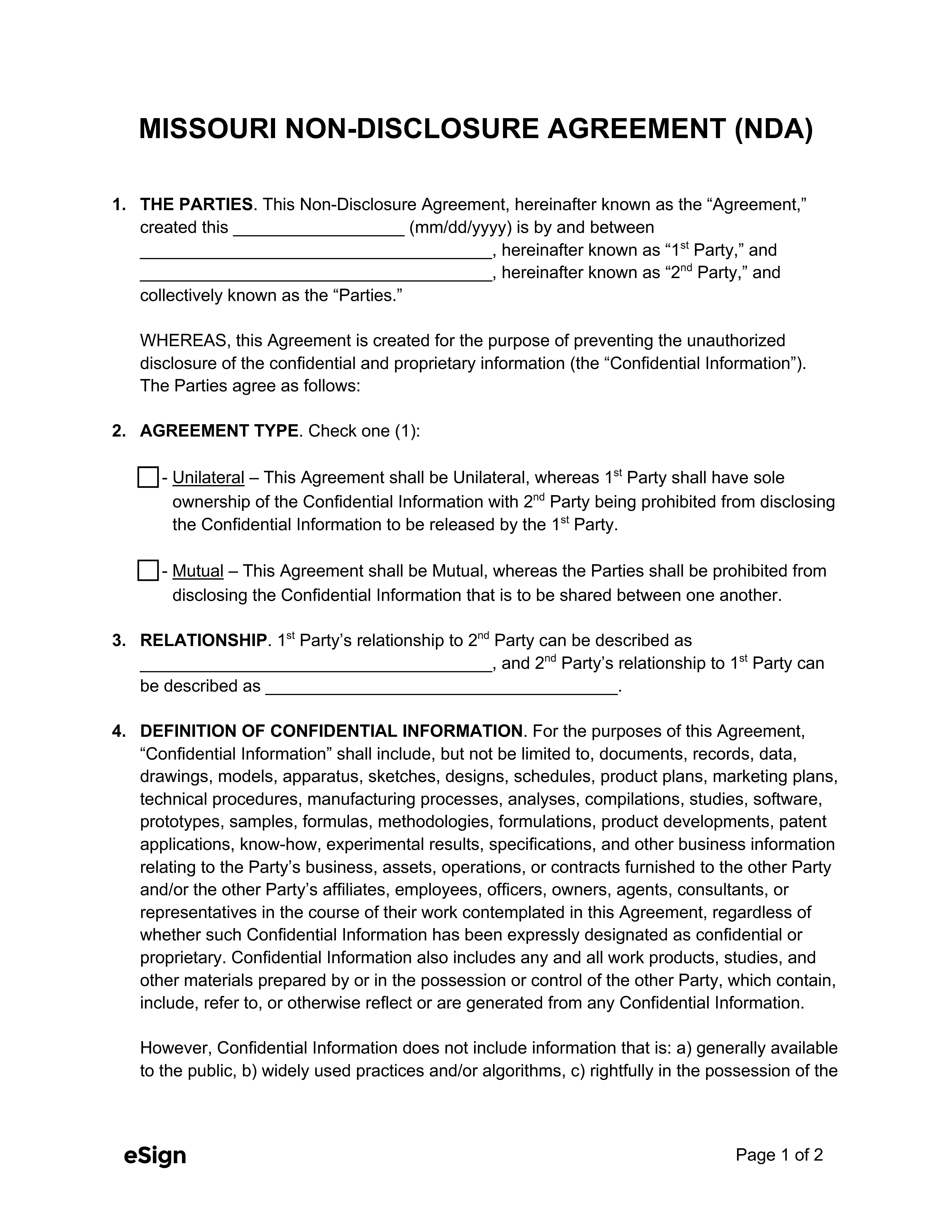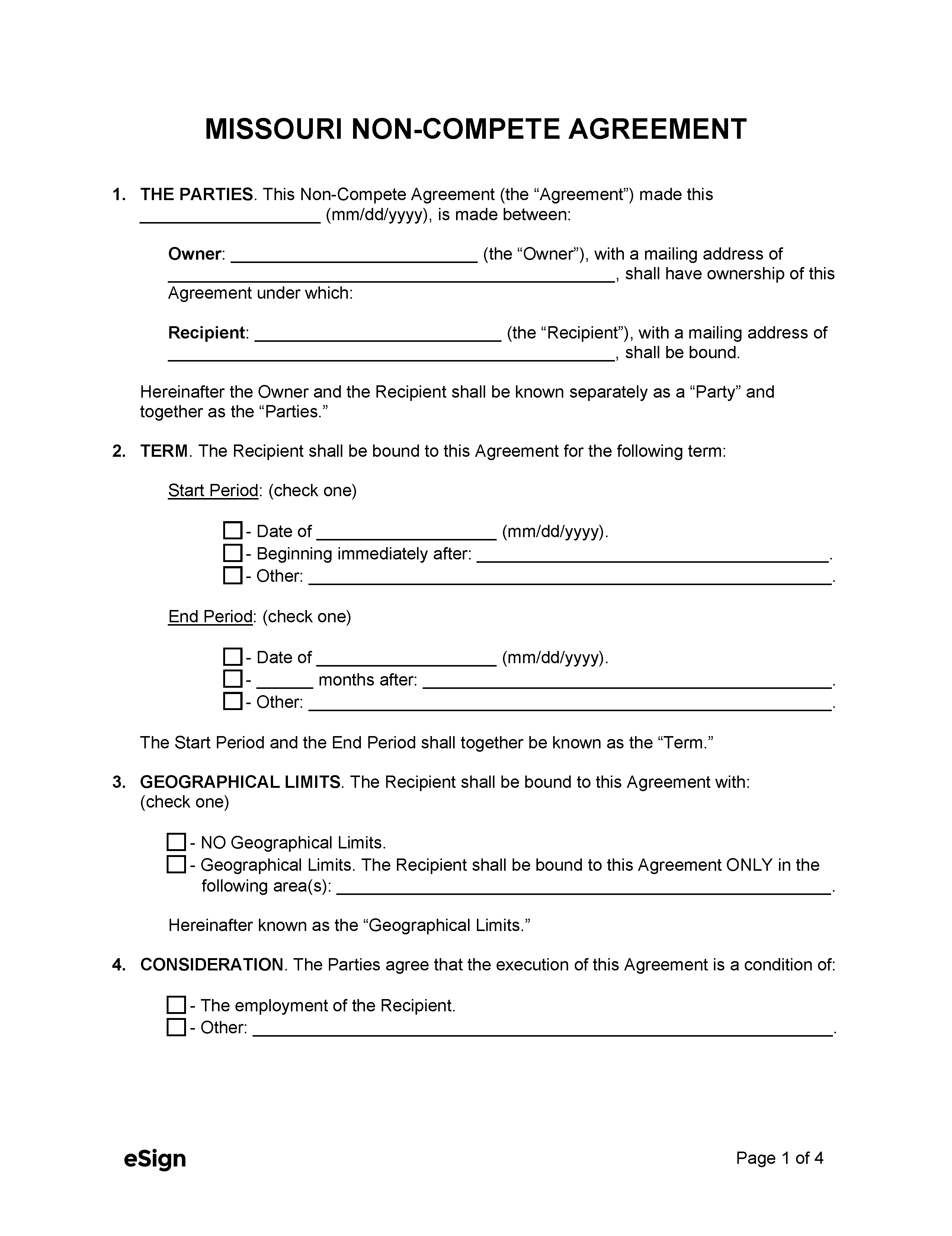A non-compete agreement will only hold up in Missouri courts if they deem it to be reasonable in its preventative measures and limited to a specific geographical scope and time period.
Contents |
Enforceability in Missouri
Non-compete agreements are enforceable in Missouri, but their equitability is judged on the facts of each case. A court of law will examine the following components of a non-compete before determining the enforceability:[1]
- Subject matter
- Purpose
- Circumstances of both parties
- Extensiveness of restrictions
- Type of industry
- Consideration
- Benefit to employer
- Restraint on employee
- Fairness to the general public
When it IS Enforceable
- Reasonability. In addition to the above-mentioned factors, an NCA must have an acceptable time and geographical limit, and the overall restrictions must only be as far-reaching as necessary to protect legitimate employer interests.[2]
- Business interests. Using state law,[3] Missouri courts reason that competition in itself is not a valid business interest to protect; trade secrets or customer contacts are the only protectable interests that would make a non-compete agreement enforceable.[2]
- Independent contractors. Although state non-compete statutes do not mention independent contractors, common law has determined that the exclusion does not preclude non-compete agreements from being upheld against independent contractors in addition to employees.[5]
When it’s NOT Enforceable
- Contract breach or wrongful termination. If the employer violates an employment contract[6] or terminates an employee without cause,[7] a non-compete may not be enforceable, although this is left to judicial discretion on a case-by-case basis.
- Secretaries and clerks. Restrictive contracts prohibiting the solicitation of employees are not enforceable on workers providing secretarial or clerical services.[3]
- Legal industry. Agreements that prohibit a lawyer from practicing law are unenforceable as they limit an attorney’s ability to provide professional services to clients.[8]
Maximum Time Period
There is no set maximum time limit for non-competes, but courts of law will enforce agreements if they are “reasonable based on the facts and circumstances of the case.”[4] However, no Missouri court has ever enforced an agreement that endured longer than five (5) years.
The duration of an NCA should only be as long as necessary to safeguard an employer’s interests.[2] Courts have deemed two-year[4] and three-year[9] terms to be agreeable and have even upheld a contract that extended to five (5) years.[1]
Geographical Area
A maximum geographical area has not been established by common law but the limit must not be unreasonable.[2] Courts of law have looked for restricted areas that were established because the employee provided services or dealt with customers in those locations. For example, a radius of 125 miles around the city of St. Louis (which covered parts of Missouri and Illinois) was considered appropriate.[10]
The range can also be quite broad: a worldwide scope was considered equitable since the business operated all over the globe,[11] and a nationwide limit was acceptable because the employee managed accounts throughout the US.[1]
Consideration
When an employer presents a non-compete to an individual in conjunction with a job offer, this is deemed adequate consideration.[12] If an employee signs a restrictive agreement after they have already started working, the courts consider the continuation of employment to be sufficient consideration as well.[13]
Sources
- Superior Gearbox Co. v. Edwards, 869 S.W.2d 239 (Mo. Ct. App. 1993)
- Healthcare Services of the Ozarks, Inc. v. Copeland, 198 S.W.3d 604 (Mo. 2006)
- § 431.202
- Whelan Sec. Co. v. Kennebrew, 379 S.W.3d 835 (Mo. 2012)
- Renal Treat. Centers-Missouri v. Braxton, 945 S.W.2d 557, 563 (Mo. Ct. App. 1997)
- Ozark Appraisal Service, Inc. v. Neal, 67 S.W.3d 759, 764 (Mo. Ct. App. 2002)
- Property Tax Representatives v. Chatam, 891 S.W.2d 153, 156 (Mo. Ct. App. 1995)
- MO RPC Rule 4-5.6
- Osage Glass, Inc. v. Donovan, 693 S.W.2d 71, 74 (Mo. 1985)
- Orchard Container Corp. v. Orchard, 601 S.W.2d 299 (Mo. Ct. App. 1980)
- Sigma Chemical Co. v. Harris, 586 F. Supp. 704, 710 (E.D. Mo. 1984)
- Nail Boutique, Inc. v. Church, 758 S.W.2d 206, 210 (Mo. Ct. App. 1988)
- Computer Sales Intern., Inc. v. Collins, 723 S.W.2d 450, 451-52 (Mo. Ct. App. 1987)
- Mid-States Paint Chemical Co. v. Herr, 746 S.W.2d 613, 616 (Mo. Ct. App. 1988)
Related Forms (1)

Download: PDF, Word (.docx), OpenDocument
